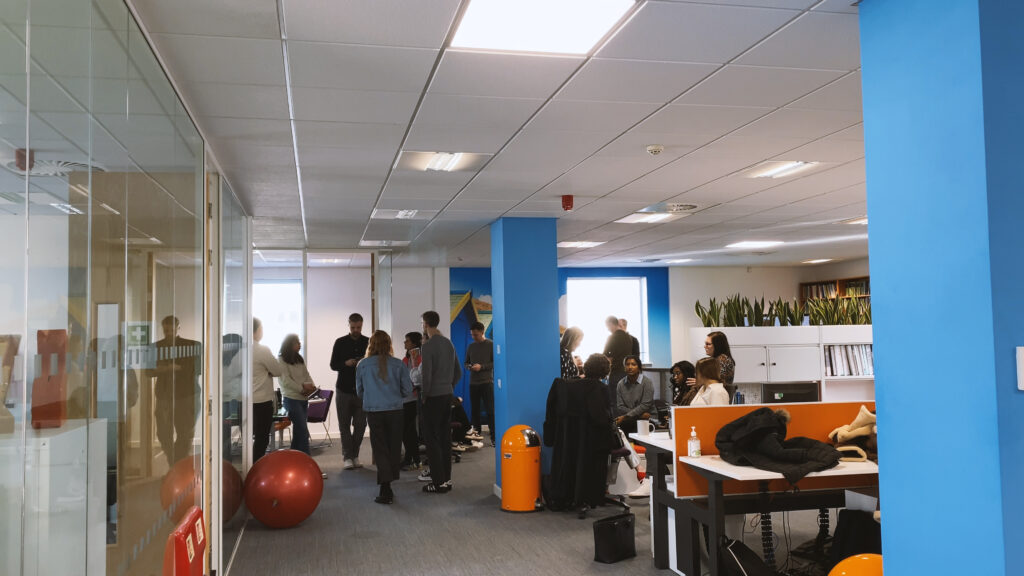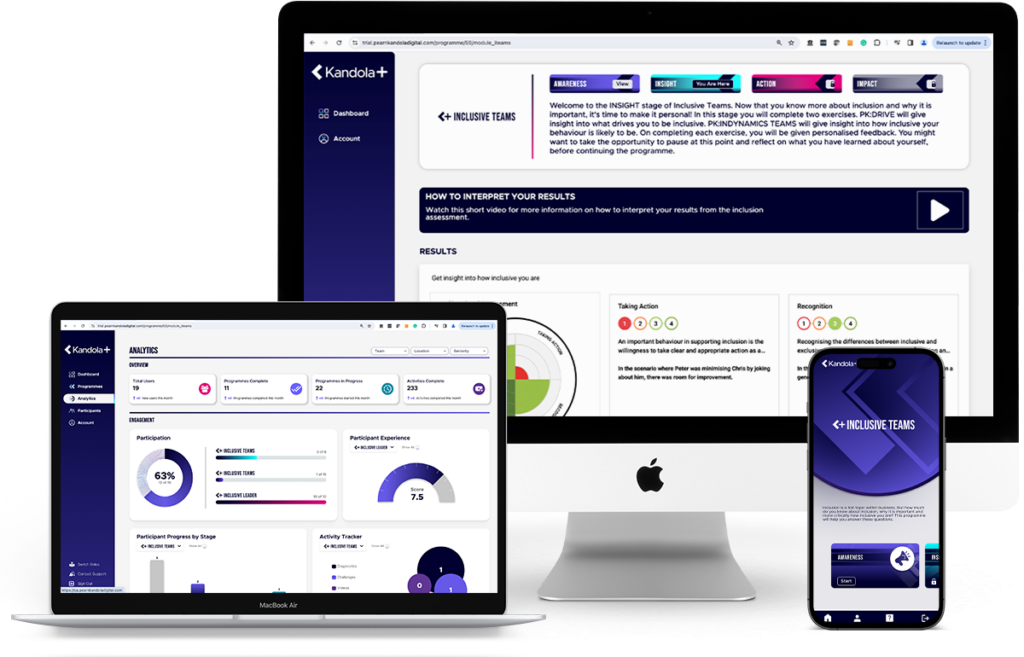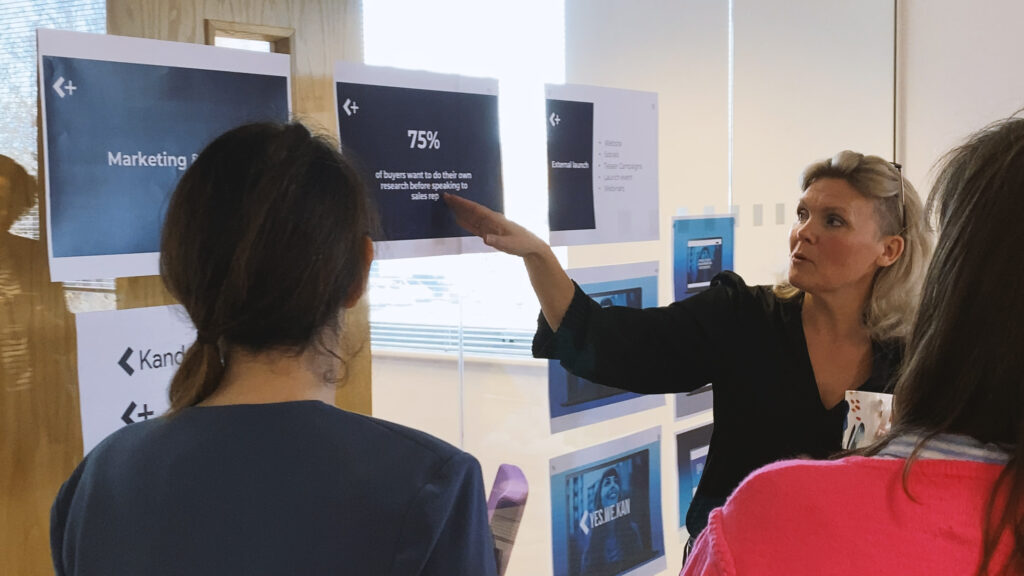Home › Services › Inclusive Cultures › Diversity, Equity & Inclusion Training
- Inclusive Cultures
Diversity, Equity & Inclusion Training
Make Your Workplace Work Better
As a firm of occupational psychologists for 40 years, Pearn Kandola have paved the way for diversity, equity and inclusion training that supports innovative, collaborative and high-performing workplaces.
We work with large organisations in over 90 countries globally to transform leadership, recruitment, development and cultures for clients including HSBC, Microsoft, Cisco and British Airways.

Popular Services
Read on to learn more about the benefits of DEI Training or if you’re looking to jump to one of our most popular DEI workshops you can choose from the links below:
• Unconscious Bias
• Inclusive Leader
• Inclusive Teams
• Active Bystander
Call us on 01865 399060 or email info@pearnkandola.com to discuss your needs.
Diversity, Equity and Inclusion Training For Business
A leading DEI Consultancy, Pearn Kandola’s mission for over 40 years has been to make the workplace, and so the world, a fairer place.
Founded long before the words diversity, equity and inclusion entered the workplace vernacular, Professor Binna Kandola OBE and co-founder Michael Pearn’s work as two of the first “occupational psychologists” was in providing equal opportunities in the workplace.
The world has changed a lot since 1984 but the firm, powered by our unmatched heritage, in-house research and expertise, remains at the cutting edge of business psychology, creating lasting change and more diverse, equitable, inclusive and innovative work environments that benefit both employers and employees.
Whether it be inclusivity training for teams and leaders, a full assessment of your current strengths and challenge areas through a DEI Audit, or targeted active bystander training to empower your workforce, we work with you based on your needs, budget and requirements.
We are proud to be powered by psychology and integrity, with a firm made up entirely of practitioners who are qualified business psychologists, a rarity in today’s landscape. Pearn Kandola has been driving change long before the momentum for it was there, and will continue to do so, driven by research, psychology and experience.
We are always keen to discuss organisational goals and barriers, so please get in touch with our team to talk through your needs in a free initial consultation.
Call or email us today.

Urgent issue to address?
We know that many organisations want to act swiftly in response to inappropriate behaviour or attitudes in the workplace – but may not have the right resources in-house to approach complex situations in the most effective way.
Our business psychologists can work discreetly with your organisation to help you to effectively and fairly approach and tackle delicate situations.
Contact us to discuss your needs.
How to create an inclusive organisation
There are four core stages to building a more diverse, equitable and inclusive organisation.
1. Conduct a DEI Audit
You can’t solve a problem if you don’t know it exists. A DEI strategy without a DEI audit is like launching arrows with no target. It doesn’t matter how many you release; none will hit the spot.
DEI Audits are there to highlight your organisation’s strengths and challenge areas when it comes to diversity, equity and inclusion. By understanding exactly what you’re doing well, you know where to keep up the good work.
By uncovering your weaker areas, you know where to focus your efforts, for more effective, faster and long-lasting improvement.
2. Create a DEI Strategy
Once your DEI audit has highlighted your strengths and challenge areas, it’s time to create an action plan to target them.
It’s important that your DEI strategy be challenging but achievable. Setting out a realistic plan based on your timescales, resources and priorities is important for striking the right balance and effecting change.
If you set your organisation overly ambitious targets, you may spread your resources too thin and fail to deliver. If you do too little, you’re unlikely to achieve any sense of momentum in your initiatives.
Working with an experienced DEI expert will help you to create an effective action plan, tailored to your budget, priorities and goals.
3. Implement your DEI Programme
Your plan is in place, now the execution is crucial for success. Your strategy needs to be backed by action.
This may include changes to policies and paperwork, 1-2-1 coaching for your executive team or tailored programmes delivered across your organisation to leaders and employees.
Many of our clients find that a top-down, bottom-up approach is vital for triggering widespread organisational change. Depending on your DEI maturity, you may already have specific areas within the employee lifecycle you wish to target and improve, such as recruitment.
Our dedicated team of business psychologists can work with you to design and deliver training that triggers lasting change in your business.
4. Measure your DEI progress
If you were climbing a mountain, you’d probably stop along the way to check your progress, make sure you’re still on the right path – and admire the views.
Easily forgotten, measurement can often be the missing link in a DEI chain, one that helps to keep momentum by celebrating your progress, acknowledging your improvements and helping to keep you on track to success.
It also allows you to adjust your strategy, which is crucial in the ever-changing landscape of the modern workplace.
Reviewing your successes can help to ensure buy-in from stakeholders and employees alike, showcasing the strength of a more diverse, equitable and inclusive organisation, while ensuring that any problems arising can be swiftly identified and tackled.
What is diversity, equity and inclusion?
Diversity, equity and inclusion represent three areas that organisations focus on to create fairer processes within recruitment, development and employee behaviour to ensure equal opportunities in the workplace.
Diversity refers to variety, and this could be across several areas that make up an individual, seen or unseen.
While we are all different in our own ways, we share specific characteristics and risk being drawn to others like us, e.g. those of the same gender or ethnicity, or those who have the same thoughts and beliefs.
This concept is known as homophily, and where individuals may unconsciously sway towards those who are like them – particularly when in positions of power – this leaves those outside of the ‘in-group’ at a disadvantage.
In the workplace, diversity is about removing barriers faced by ‘outsider’ groups that may be preventing them from applying for roles, being fairly considered for a job, promotion, or even being treated differently in the workplace.
Under the Equality Act (2010) there are several areas where an individual is protected based on their personal characteristics. These protected characteristics include:
- Age
- Disability
- Gender reassignment
- Marriage of civil partnership
- Pregnancy and maternity
- Race
- Religion or belief
- Sex (Gender)
- Sexual orientation
Employers are legally required to ensure that their policies and procedures to not – directly or indirectly – discriminate against anyone based on these characteristics and can face legal action as a result of not doing so.
In the UK alone, there were 32,000 single claim and 438,000 multiple claim employment tribunal cases outstanding between Q2 (June-September) 2023.
But it’s not just about staying on the right side of the law. Research shows that companies with diverse workforces earn 2.5x higher cash flow per employee, and that diverse teams make better decisions 87% of the time.
Diversity of talent brings diversity of thought. If your culture is one that supports everyone as an individual, and helps everyone to respect and understand each other, then employee wellbeing, productivity and innovation will thrive, with more effective and harmonious teamwork.
Equity is about understanding and respecting that we do not all start at the same point, and that – based on our characteristics, such as those outlined above – there are groups that will be at a disadvantage from the moment they apply for a role.
We know this, and research and data backs it, for example it’s clear in our gender and ethnicity pay gaps.
In the workplace, equity is about removing the processes, attitudes and procedures that hold people back, and is about trying to bring everyone up to the same ‘starting line’, so that everyone is assessed based on their work, not who they are, whether consciously or unconsciously.
You can read more about this in our article.
Inclusion is, in many ways, ‘what it says on the tin’! It’s about ensuring that everyone, regardless of who they are and where they come from, feels included and supported in the workplace.
This includes supporting individuals to work in their own ways and understand that each of us may need different support to do our job effectively and thrive on behalf of the business.
While some might feel that this is giving individuals preferential treatment, it’s actually about making the workplace better for everyone.
For example, introducing a quiet place to work in the office may make a huge difference to a neurodivergent individual who may be impacted by the sensory overload that a busy office can bring.
It could also be of great help to a neurotypical employee who needs a quiet space for a multitude of other reasons.
When we feel included, we feel safer. When we feel safer, our wellbeing improves, we feel confident in our work and are more likely to stay and thrive within an organisation.
Click into each word above to learn more.
What is diversity, equity and inclusion training?
Diversity, equity and inclusion training is – as the name suggests – about making the workplace a more diverse, equitable and inclusive place.
While this applies to the overall culture and people, it’s also about improving processes, attitudes, behaviours and procedures in the workplace.
Put simply, it’s about making the workplace work better, for everyone. This is to ensure everyone can feel psychologically safe in the workplace and have the support they need to thrive in their role.
DEI training is a generic term and can include improvements to processes and paperwork, to help make them fairer and more inclusive, as well training that might be delivered to individuals or groups to support more inclusive behaviour. This might include unconscious bias training, inclusive leadership training or micro-incivilities training, for example.
If workplaces are more inclusive, and barriers that may be putting people at a disadvantage are addressed and removed, then everyone benefits from an even playing field.
When a workplace is inclusive and fair to all, talented, hardworking individuals can thrive, be identified and progress – a real meritocracy. This is of clear benefit to both business and employees.
Is DEI training illegal?
No. There is a misconception in some minds that DEI policies and initiatives are about one specific group or about giving anyone an unfair advantage. In fact, they work to identify and remove any unfair advantages that already exist.
DEI policies are about every single one of us. DEI is about making the workplace work better, for everyone.
Are DEI policies positive discrimination?
Absolutely not. DEI is about removing obstacles and unfair advantages that exist, not creating them.
Anything that does give an individual or group an unfair advantage or favourable treatment, based purely on a protected characteristic (e.g. such as their race or gender), would be positive discrimination – which is illegal under the Equality Act (2010) in the UK and Title VII of the Civil Rights Act (1964) in the USA.
This is very different to positive action which, again, is about overcoming or attempting to minimise a disadvantage that already exists.
If you are unsure about a policy that exists in your organisation and would like some support to ensure disadvantages are being removed, please get in touch with our expert team.
Why is it called DEI?
We refer to this training as diversity, equity and inclusion (DEI) training, however you may have heard of other terms and acronyms, or your organisation may refer to the same type of training under a slightly different name.
Ultimately, the end goal is generally the same for any organisation – to make the workplace more fair, effective and productive, ensuring that talented individuals want to work for them and are in an environment that where they feel safe and supported to succeed.
Other common names for diversity, equity and inclusion training include:
- Equity, diversity & inclusion, EDI, ED&I
This is the same as DEI, simply in a different order! This is a popular acronym particularly in the education sector, however, is not as widely used as DEI or D&I. - Equality, diversity & inclusion, EDI, ED&I
To learn why we use the term ‘equity’ instead of equality read our article ‘Why leaders should lead with equity, not equality’. - D&I, Diversity & Inclusion
Many organisations still use this to encapsulate their DEI initiatives, and it does not mean that they are not working on improving equity within their business. - Equal opportunities
An older term, less commonly used.
No matter what term your organisation uses, our in-house team of business psychologists can support you to create more diverse, equitable and inclusive workplaces to help you to attract, retain and support talent to thrive.
What’s the difference between DEI and EDI?
Generally speaking, both acronyms refer to D = diversity, E = equity and I = inclusion, just in a different order.
In some organisations, the ‘E’ in EDI or ED&I stands for ‘equality’ rather than ‘equity’.
We believe that in order to achieve equality, organisations should focus first on equity. Learn more in our article.
How Much Does DEI Training Cost?
Unfortunately, there is no simple answer to this question. The biggest factor will be what your organisational goals are, as depending on what you are trying to achieve – and who you are trying to reach – there will be different programmes and approaches that will be most effective for your needs.
For example, an in-person workshop for up to 25 people – based on a specific subject area, utilising existing research and processes – may be in the region of 3,500-£7,500 depending on the content and scope of work.
A completely bespoke piece may be far higher than this, due to the additional design work involved, or for example for 1-2-1 inclusion coaching for a senior leadership team would vary based on the timeframe of the work and experience of the practitioner involved.
An example of the factors that would impact the cost of DEI training would include:
- Overall organisational goals
- Number of people to go through training
- Number and type of teams to go through training
- Number of languages the training will be delivered in
- Seniority of those going through the training
- Number of training areas to be covered
- How bespoke the training would be
- Whether you’re looking to introduce ‘train the trainer’ initiatives for in-house teams
- Whether your training will be delivered in person, live online or through self-paced learning
- Whether you’re looking to include DEI in other areas of learning and development, such as leadership development centres, 1-2-1 coaching or recruitment.
Beyond these areas, cost will also always depend on the expertise, experience and qualifications of the training provider you choose to work with.
At Pearn Kandola, all our practitioners are qualified Business Psychologists, and those who deliver our leadership coaching/development programmes are also accredited coaches.
We are also confident in our ability to deliver, and as such none of our programmes are ‘off-the-shelf’, as through 40 years of expertise in this area, we know that there is no one-size-fits-all.
We make change happen, and our programmes are proven to deliver behavioural change, where traditional e-learning and off the shelf workshops do not.
If you’d like to discuss your needs, please reach out to us via +44 (0)1865 399060 or email info@pearnkandola.com
How long does DEI training take?
Again, much like the cost, there is no straightforward answer to this.
It will depend very much on your organisational goals, strategy and initiatives that you have planned to address them.
For example:
- 1-2-1 inclusion coaching with individuals from a senior leadership team (SLT) could run for, say, a period of 12 weeks, with weekly 1-hour sessions for each senior leader.
- You might have focus groups being conducted as part of a DEI audit, which might take 2 hours each per group of 10 employees.
- Your training might involve workshops* that could run for 2-3 hours for each group of employees.
*It’s important to note that when it comes to workshops or short courses, off-the-shelf, standalone workshops just don’t cut it.
We know, for example, that a simple 1hr awareness raising workshop won’t equip attendees with actionable inclusion skills or lead to any lasting behaviour change.
Attendees may well be more aware of why inclusion matters, or how exclusive behaviour manifests in the workplace, but they will have no skills to apply themselves.
Pearn Kandola’s live DEI workshops, such as Inclusive Leader and Inclusive Teams, for example, run for between 2-3 hours (depending on the topic) but before this, every participant will have access to our exclusive digital programme, to understand their current strengths and challenge areas when it comes to inclusion.
The workshop is then tailored to each organisation, based on the results of participants, to target your group’s common challenge areas.
Following the workshop and digital element of the programme, each participant will receive targeted actions, based on their own challenge areas, to take away and work on over a 3-month period.
After this, participants can measure – and, depending on the programme, have others measure – their progress.
With 96% of learners becoming more inclusive in their behaviours following our programmes, our approach is proven to trigger lasting behaviour change.
Ultimately, DEI training isn’t a ‘one and done’ exercise, like any skill it takes continuous application to keep it sharp.
Successful organisations will take an ongoing approach, as with any area of development, to maintain, improve and develop inclusive workplaces and behaviours.
For the end user (e.g. one of your employees) it might be that their in-person training may take a matter of hours, but, with the right approach and guidance beyond this, inclusive behaviours should weave their way into their daily working lives.
Is DEI training mandatory?
No. Some organisations choose to make it so, but we actually advise clients not to make it mandatory. This is because research shows that it’s less likely to be effective if people feel forced into it.
There are some industries that have requirements related to DEI, and this may be outlined by governing bodies or national/regional laws.
For example, in the UK, the Financial Conduct Authority (FCA) proposed measures in 2023 to boost diversity and inclusion standards in the financial services sector.
Requirements proposed for larger firms include:
- Developing a diversity and inclusion strategy
- Collecting, reporting and disclosing data against certain characteristics
- Setting targets to address under-representation
So while DEI training isn’t mandatory ‘across the board’ there will certain regulations in place from governing bodies, or at the government level (such as mandatory gender pay gap reporting) that will certainly impact organisations’ needs to implement DEI strategies, goals and training.
Worker Protection Act 2023 (Amendment of Equality Act 2010)
A recent example of a law change that could impact organisations is the Worker Protection Act 2023. This act, passed in October 2023, comes into effect in October 2024.At this time, an employer must take reasonable steps to prevent sexual harassment of its employees in the course of their employment.
Tribunals will have the power to increase compensation by up to 25% if they find an employer has breached this duty.So, in this example, while DEI training itself is not mandatory, employers will be expected to provide training on identifying and preventing sexual harassment within the workplace to remain compliant with this law change.
What are the benefits of diversity, equity and inclusion training?
Diversity, equity, and inclusion training has a number of benefits in the workplace, both for employees and employers.
Employee wellbeing
Research shows that feelings of exclusion in the workplace take a mental and physical toll on individuals, with exclusion triggering the same area in the brain that we feel physical pain.
When employees feel included, valued and psychologically safe in the workplace, they are more likely to have a better sense of wellbeing and happiness at work. This, in, turn, has a number of other benefits for organisations and employees.
Productivity and Teamwork
Oxford University’s Said Business School conducted a study that showed that happy workers are 13% more productive.
Employees who respect and understand each other – and are aware of how to overcome their unconscious biases – are more likely to work effectively together.
Research has also shown that inclusive teams are 35% more productive and diverse teams make better decisions 87% of the time.
Innovation
McKinsey’s diversity wins research shows organisations in the top quartile for gender diversity are 25% more likely to outperform their peers, with those in the top quartile for ethnic diversity 36% more likely to outperform their peers.
Talent attraction and retention
It may seem obvious to say, but if we feel included, reported and recognised in the workplace – and feel like we are treated the same as our colleagues, with the same opportunity to progress – we’re more likely to work harder, and stay longer.
With 3 in 4 job seekers saying a diverse workforce is an important factor when evaluating job offers, it’s clear the impact a diverse and inclusive organisation will have on attracting and retaining talent.
Talent pipeline
It doesn’t stop at bringing in top talent to your organisation, and keeping them. It’s about development too. If you remove unconscious bias from decision making, and make your performance management processes fair, you’re more likely to easily identify and develop top talent, protecting your pipeline of future leaders.
Ultimately, diversity, equity and inclusion maximises both the individual and collective success of your employees and your business.
When your employees feel included in the workplace, they are more likely to work better together, and you’re more likely to attract a diverse pool of talent – and diversity of thought – for a more innovative, progressive and motivated workforce.
Who is Pearn Kandola’s DEI training suitable for?
As experienced DEI consultants and business psychologists, we work with large organisations (generally with 500-10,000+ employees) to support their short and long-term DEI objectives.
We can work with in house DEI and HR teams to develop DEI strategies and deliver associated training or design a training plan to address any existing strategy or initiatives.
Occasionally we will be brought in to address a pressing issue, for example if something happens externally or internally which requires an immediate response.
We’re proud to work with organisations across a variety of sectors, from law firms, universities and local government to central government, FTSE250 and Fortune500 businesses.
In our mission to make the world fairer, your organisational goals become our organisational goals, and we leverage our heritage, in-house expertise and innovation to design and deliver programmes that will help you to achieve them.

Smaller organisation looking for support?
Meet Kandola+
For small and medium enterprises looking to deliver effective training at scale, you may be interested in Kandola+, our digital platform that is changing the game for online DEI learning.
DEI Training, designed and delivered by Pearn Kandola
With 40 years’ expertise in creating diverse, equitable and inclusive organisations, Pearn Kandola are DEI Consultants with an unmatched heritage, powered by psychology and cutting-edge technology.
We create more inclusive and effective leaders, teams, recruitment processes and cultures to help your employees – and your business – thrive.
If you have any further questions about DEI training, leadership development or inclusive recruitment, or to discuss your organisational goals, please get in touch.
For more information call 01865 399060 or email info@pearnkandola.com.

Contact Us
Free Consultation with a Business Psychologist
Talk to us about your goals and see how we can help your organisation become more inclusive, diverse and equitable – meaning you’ll attract and retain top talent for a higher performing, happier workforce with a competitive edge.
21 years’ experience
Louise Weston, Partner